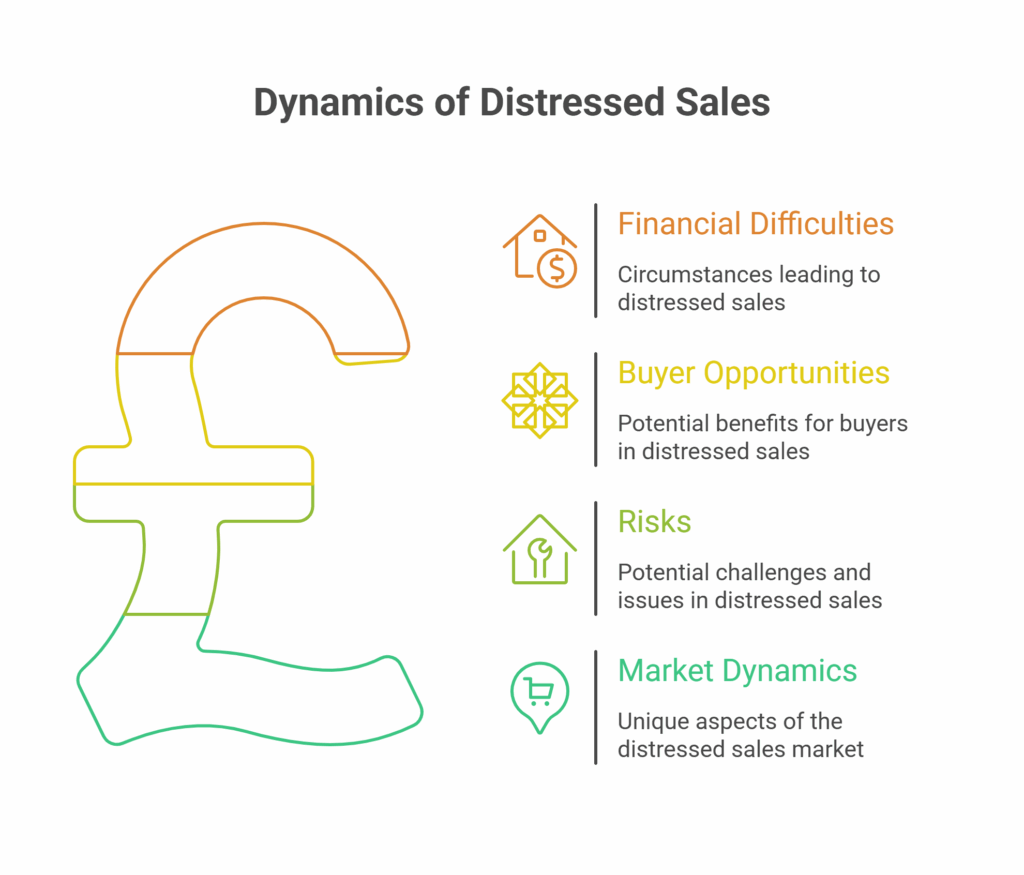Quick Answer: What Is a Distressed Sale?
A distressed sale happens when a property, asset, or investment is sold urgently, often below market value, due to financial pressure on the owner. In simple terms, what is a distressed sale? It’s when sellers don’t have the luxury of waiting for the best price because they may be facing foreclosure, debt, or urgent cash needs.
Buyers may benefit from discounted deals, but sellers usually accept less than the true worth of their asset to close quickly.
Now let’s dive deeper.

Types of Distressed Sales
There are several types of distressed sales, each with unique implications for buyers and sellers. Understanding these distinctions is crucial for making informed decisions.
1. Foreclosure Sales
The process of foreclosure occurs when a property owner fails to make the mortgage payment, whereby the lender takes possession of his property and sells it to reduce the loan amount. The foreclosure properties usually sell at auctions or bank listings at a discounted price. Buyers should, however, be wary of the risks involved, including unpaid taxes or repairs that may need to be addressed.
2. Short Sales
A short sale occurs when the homeowner sells the property for a lesser price than the amount owed on the mortgage with the lender’s consent. This process allows distressed homeowners to avoid foreclosure while offering buyers the possibility of purchasing a home at a discounted price. Short sales do involve a lengthy approval that may take several months to navigate.
3. Estate Sales
When the owner dies, their successors could be forced to offload the property in a hurry to pay their debts or divide the assets. Such transactions, mostly called estate sales, usually come with cut-rate prices, especially when the successors do have not enough money to upkeep the property.
4. Divorce Sales
Couples divorcing can be forced to sell their house quickly to split property. The pressure to sell pushes them to price the house competitively, favoring buyers willing to make a quick deal.
Pros and Cons of Distressed Sales
Distressed sales come with both opportunities and risks. Here’s a closer look at the benefits and challenges involved:
Pros for Buyers:
- Lower Prices: Properties are often sold below market value, making them attractive investment opportunities.
- Less Competition: As troubled properties could need repair or legal work, fewer purchasers vie for them.
- High Returns Potential: Renovate and resell investors of distressed properties can gain huge profits.
Cons for Buyers:
- Property Condition Problems: Distressed properties often are sold “as-is,” so they could need expensive repairs.
- Complex Transactions: Legal issues, such as liens or lender approval, may hold up the buying process.
- Uncertain Market Value: When prices are down, it may be difficult to determine fair market value in a distressed sale.
Pros for Sellers:
- Quick Sale: Distressed sales offer a fast way to liquidate assets and resolve financial difficulties.
- Potential to Avoid Foreclosure: Short sales and fast transactions can help homeowners minimize damage to their credit score.
Cons for Sellers:
- Lower Sale Price: Sellers rarely get full market value for their property.
- Limited Negotiation Power: The urgency to sell often leaves sellers with little room to negotiate terms.
How to Navigate a Distressed Sale?
It is essential to distinguish distressed sales for proper decision-making regardless of whether you are a buyer or seller. Once the buyer is ready to make an offer: Good practice would suggest that he examine extremely well the conditions of the property debts attached to it and its legal history. Distressed sales happen pretty quickly, so being pre-approved for financing will raise your chances. Knowledgeable professionals estate agents, lawyers, and inspectors can help buyers avoid mistakes and make wise decisions.
By knowing what a distressed sale is, sellers can look into alternatives such as short sales, loan modification, or refinancing before selling at a loss. Realistic property pricing is crucial in a distressed sale; sellers may not get full value for their property in a distressed sale, but a price set competitively will command buyers’ attention more quickly. It is also important for sellers to acquire legal and financial advice to avoid any potential pitfalls and attain the best possible results in a distressed-lensed sale.
Final Thoughts
Distressed sales represent a unique segment within the real estate market, presenting both challenges and opportunities. These sales are especially important for buyers and sellers alike; understanding what distressed sales entail can help you make the best decision for your pocketbook—whether you’re looking for a bargain property or a fast sale. El Paso cash home buyers are often key players in these transactions, providing quick solutions for homeowners needing to sell under pressure. If you want to read more about distressed sales and their effect on property valuation, see our next blog, where we go into more detail about determining fair market value in these transactions.
Call us anytime at 713-561-5162 or connect with us on our website and we’ll lay out all of your options for your specific situation.
